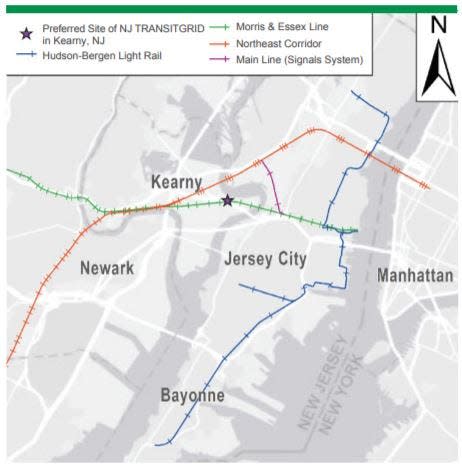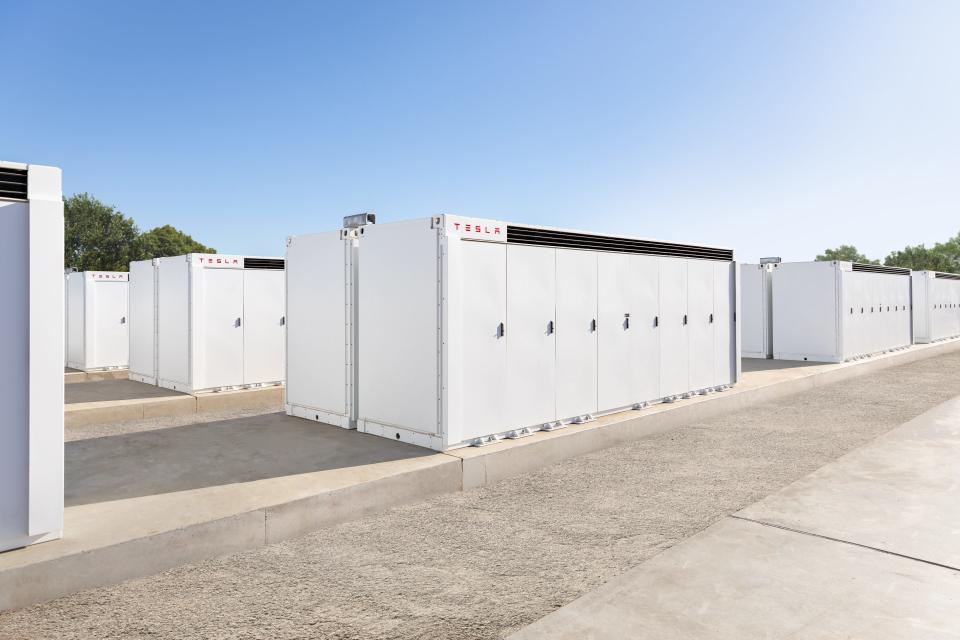Activists push green energy to counter NJ Transit's plan for fossil fuel power plant
Environmental activists heralded a new report Thursday that they say proves a hybrid renewable energy microgrid is feasible to help power NJ Transit's power needs during an unexpected outage, as opposed to a fossil-fuel-burning power plant in Kearny that the agency is currently weighing.
At a rally protesting the plant before Monday's NJ Transit board meeting, Iveth Mosquera spoke about how she left Newark to move to Kearny after her children were born with asthma and she feared for their health from local pollution.
"My kids were born down the street, and they suffered from asthma, debilitating asthma, debilitating allergies all of their lives, and I’m almost 100% sure it has to do with the pollution in the Ironbound," she said to the 20 or so activists who gathered in front of NJ Transit headquarters. "Then we moved to Kearny thinking it was a little better. Well, Kearny is probably just as polluted as Newark."
The report promotes a "no-regrets" solution that would generate 97 megawatts of power using solar panels, 76 megawatts of four-hour battery storage, and 32 megawatts from a backup gas turbine. It could generate $16 million more in revenue over time for the agency than a fossil fuel plant by selling power to Amtrak, the report says.
The 14-page study was commissioned by EmpowerNJ, a coalition of environmental organizations, and Clean Energy Group, a national nonprofit.
Microgrid spurred by Superstorm Sandy damage

The idea to build a microgrid for NJ Transit came about after Superstorm Sandy knocked out power throughout the state in 2012. NJ Transit was awarded a $409 million federal grant, which would cover the majority of the estimated $577 million to construct a gas-fired, 140-megawatt power plant in Kearny on 48 acres by the Hackensack River.
The original proposal was developed to improve the reliability of electricity for the agency's rail network, which has on average 16 power outages annually.
For subscribers:NJ Transit lacks a key asset other agencies have. Without it, there could be service cuts
Activist opposition for years to project
Activists have flooded NJ Transit board meetings for years to tell the board to end the project or find a cleaner alternative to avoid the estimated 383,000 to 571,000 tons of carbon dioxide that would be emitted by the power plant annually.
In 2020, NJ Transit announced that it was including a $3 million stipend program to incentivize bidders to design a proposal that would be 100% powered by renewables by 2050, but did not preclude the use of gas in the near term.
The report unveiled Monday was authored by Joe Goodenbery, Eliasid Animas and Joe Walderman of the Berkeley, California-based firm Strategen Consulting.
Challenges to hybrid model
There are several challenges to the hybrid model proposed by Strategen, including that the design, as outlined in the report, would not be able to generate 140 megawatts of power, which was among the requirements in NJ Transit's request for contractors to submit bids to design the project.
It would also require 300 to 350 acres of land for solar panels. The hybrid model would "cost less than the proposed (combined cycle) power plant," the report says, but it does not detail upfront capital cost estimates or account for land acquisition costs to host solar panels.
Stile:Why is Josh Gottheimer pushing hard against NJ congestion pricing? Look to 2025
The report noted that NJ Transit owns at least 500 acres that could hold solar panels and there are more than 1,200 acres in nearby sites that could also work.
Matt Smith, New Jersey state director for the nonprofit group Food & Water Watch, said he hopes the report inspires NJ Transit to amend its request for bid proposals.
His concern is that the agency's request for bids as presently phrased seeks designs for a power plant that would use fossil fuels in the immediate term, but would transition to a green fuel technology, such as hydrogen or ethanol, or else use a concept known as carbon capture, which he said is "completely unproven and not cost-effective."
Board members express reservations on renewable technology

NJ Transit board members, including Bob Gordon, who has also served on the state Board of Public Utilities since 2018, have voiced reservations in the past about whether the technology exists to produce 140 megawatts of power using only renewable energy sources.
By way of comparison, a similar controversy unfolded in Ventura County, California, in recent years when the community balked at another fossil-fuel-burning power plant coming online, forcing the local government to consider a renewable energy alternative. In 2021, a 100-megawatt battery storage system went live in Oxnard using Tesla megapack battery technology to store energy and power tens of thousands of homes in that community for four hours during an outage.
NJ Transit President and CEO Kevin Corbett said he had not yet received the report, but hopes that by extending the time and money of the stipend in the RFP, the agency will receive robust proposals that incorporate renewable energy. He said two finalists should be chosen next month and an award announced next year.
This article originally appeared on NorthJersey.com: NJ Transit power plant under protest, activists want green option

